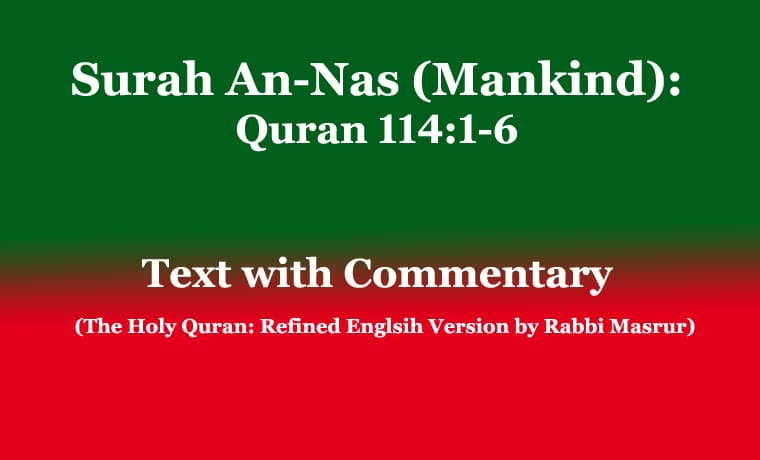Discover the profound message of Surah An-Nas, the final chapter of the Qur’an, which teaches seeking refuge in Allah—the Lord, King, and God of mankind—from the evils of whispers and mischief. Explore a detailed commentary on its verses, highlighting its spiritual significance and practical lessons for protection and inner peace.
Surah An-Nas (Mankind): Text with Commentary
Surah An-Nas (Mankind): Text
- Say: I seek refuge with the Lord of mankind
- The King of mankind
- The God (worth worshiping) of mankind
- From the mischief of the whisperers
- Who whisper evils in the hearts of men and withdraws
- Whether they are from jinns or men.
Surah An-Nas: Commentary
Surah An-Nas, the last chapter of the Qur’an, is a beautiful and profound prayer for protection from evil. It addresses the vulnerability of humans to inner and outer influences and offers a way to seek refuge in Allah, the Ultimate Protector.
Verse-by-Verse Explanation
1. “Say: I seek refuge with the Lord of mankind”
The Surah begins with a directive to seek protection from Rabb an-Nas (Lord of Mankind). The word Rabb denotes not only a Creator but also a Sustainer, Protector, and Guide. This verse establishes Allah as the caretaker of humanity, someone who nurtures and safeguards His creation. By addressing Allah as the Lord specifically of mankind, it reflects the intimate and personal relationship between humans and their Creator.
2. “The King of mankind”
Here, Allah is addressed as Malik an-Nas (King of Mankind). This title emphasizes Allah’s absolute authority and dominion over all creation. Unlike earthly kings, who rule temporarily and with limitations, Allah’s sovereignty is eternal, just, and boundless. Recognizing Allah as the King reminds believers of their ultimate accountability to Him and the futility of seeking refuge in worldly powers.
3. “The God (worth worshiping) of mankind”
In this verse, Allah is called Ilah an-Nas (the God of Mankind), underscoring His unique status as the only deity worthy of worship. This title completes the progression of attributes: Allah is the Sustainer (Rabb), the Ruler (Malik), and the Sole Object of worship (Ilah). It calls attention to the human tendency to seek comfort or answers elsewhere, reinforcing that only Allah can provide true refuge and salvation.
4. “From the mischief of the whisperers”
The source of harm is identified as al-waswas (the whisperer). This refers to Satan and his agents, who implant evil thoughts and doubts in the hearts of people. The term mischief reflects the subtle and deceptive nature of these whispers, which often lure humans into wrongdoing without them realizing it.
5. “Who whisper evils in the hearts of men and withdraws”
This verse describes the method of the whisperer: injecting harmful ideas or doubts and then retreating. The withdrawal reflects Satan’s cowardly nature, as he flees when met with resistance or remembrance of Allah. The focus on the heart is significant, as it is the seat of emotions, faith, and intentions. When the heart is influenced negatively, it can lead to destructive actions.
6. “Whether they are from jinns or men”
Finally, the verse reveals that the whisperer can come from both jinn (unseen beings) and ins (humans). While Satan and other jinn are known to mislead people, humans can also act as agents of temptation and harm. This duality underscores the pervasive nature of such mischief and the importance of seeking Allah’s protection at all times.
Thematic Reflections
Human Vulnerability: The Surah An-Nas highlights the susceptibility of humans to external influences, whether from spiritual beings or other people. It serves as a reminder to remain vigilant and spiritually grounded.
Allah as the Ultimate Refuge: By invoking Allah’s attributes—Rabb, Malik, and Ilah—the Surah reassures believers that they have a powerful protector who oversees every aspect of their lives.
Spiritual Warfare: The subtlety of whispers reflects the ongoing battle between good and evil in the human heart. This Surah equips believers with the means to guard themselves through faith and reliance on Allah.
Collective and Individual Protection: The Surah An-Nas addresses mankind as a whole, but its message is deeply personal. Each individual is encouraged to seek refuge for their heart, recognizing their unique challenges and vulnerabilities.
Practical Lessons
- Fortify Your Heart: Regularly seek Allah’s protection against both visible and unseen harms. Recite Surah An-Nas as part of your daily prayers, especially in the morning and evening.
- Stay Spiritually Aware: Be mindful of thoughts and influences that may lead you astray. Engage in remembrance (dhikr) and seek forgiveness often.
- Avoid Negative Influences: Identify and distance yourself from people or environments that encourage sinful or harmful behavior.
- Turn to Allah Alone: Recognize that ultimate peace and safety lie in Allah’s protection, not in worldly measures.
Conclusion
Surah An-Nas is a powerful prayer that encapsulates the human need for divine protection. It reminds believers of their dependence on Allah and the importance of turning to Him for help against spiritual and psychological harm. Reciting and reflecting on this chapter can build a stronger connection with Allah and develop resilience against evil influences.
N.B. Please share your feedback if you like the Surah An-Nas and its Commentary. We appreciate feedback of any kind.
You May Like: Surah Al-Fatiha: Text with Commentary






